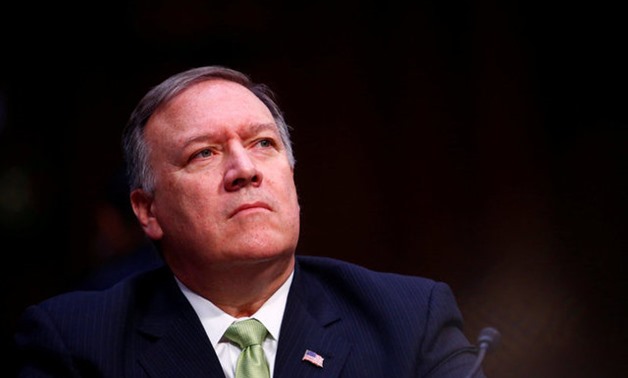
Central Intelligence Agency Director Mike Pompeo testifies before the U.S. Senate Select Committee on Intelligence on Capitol Hill in Washington - REUTERS
WASHINGTON - 12 April 2018: U.S. senators preparing for Mike Pompeo's confirmation hearing on Thursday to become the next secretary of state said one of their main questions would be: will the CIA director be able to stand up to U.S. President Donald Trump?
Trump nominated Pompeo to become the country's top diplomat on March 13 when he fired Rex Tillerson, the former chief executive of Exxon Mobil.
In his remarks, Pompeo will signal a harder line toward Moscow, while also delving into U.S. foreign policy challenges on North Korea, Iran and China, according to excerpts of his opening statement released in advance by the White House.
"Russia continues to act aggressively, enabled by years of soft policy toward that aggression. That's now over," he will say, according to the testimony.
Pompeo's nomination comes as the Trump administration weighs military action in Syria over a suspected poison gas attack, which killed dozens of people and injured hundreds in the town of Douma.
In the excerpts, Pompeo does not refer to Russia's apparent meddling in the 2016 U.S. election campaign, but the issue is likely to be raised by both Democrats and Republicans, some of whom have accused Trump of failing to be tough on Moscow.
Trump forged a warm relationship with Pompeo during White House meetings over the first year of his presidency and feels the former Republican congressman shares more of his view of the world than Tillerson, who at times disagreed with the president.
Members of the Senate Foreign Relations Committee said they would press Pompeo on the administration's strategy on Syria, relations with Russia, North Korea's nuclear ambitions and plans for dealing with China's growing international influence.
Pompeo is seen as more hawkish than Tillerson, for example, as an outspoken opponent of the international nuclear agreement with Iran. In his testimony, he will try to shed the label of being a "hawk", arguing that he would prefer "unrelenting diplomacy rather than by sending young men and women to war."
But senators said a major concern was whether Pompeo, a former Republican congressman, would break from Trump or convince him to change his mind when necessary.
"His reputation is not that strong on standing up to the president," Senator Ben Cardin, the ranking foreign relations Democrat during most of Pompeo's tenure at the Central Intelligence Agency, told reporters after meeting with Pompeo.
"It is very important to me to know that the next secretary of state will stand up for what he believes in and represent the advice and expertise of the State Department," Cardin said.
Cardin voted against Pompeo as CIA director but said he had not made up his mind about the position at the State Department.
STATE DEPARTMENT CUTS
Republicans and Democrats have criticized the Trump administration for seeking sharp cuts in the State Department budget and failing to fill a host of diplomatic positions.
Pompeo faced resistance before his confirmation as CIA director last year over past comments on the agency's use of waterboarding and other interrogation techniques commonly regarded as torture.
Concerns have also been raised about Pompeo's record of anti-Muslim remarks and ties to anti-Islam groups. A CIA spokesman said Pompeo had "worked extensively, and successfully" at strengthening the agency's relationships with countries throughout the Muslim world.
While Pompeo will likely be confirmed by the full Senate if his hearing goes well, he could be the first nominee to be secretary of state not to be approved by the foreign relations committee, where Trump's Republicans have just an 11-10 majority.
Republican Senator Rand Paul is already a no, citing what he called Pompeo's support for war and past record on interrogations.
Senator Bob Corker, the committee's Republican chairman, said it was too early to tell how the vote would go and said even he had not decided how he would vote, though he had a "very good first meeting with him and a good conversation."
The Senate's Republican leaders can bring the nomination up for a vote even if Pompeo is reported unfavorably out of the committee. The date for the vote in the full Senate has not been set but is likely in the coming weeks.


Comments
Leave a Comment